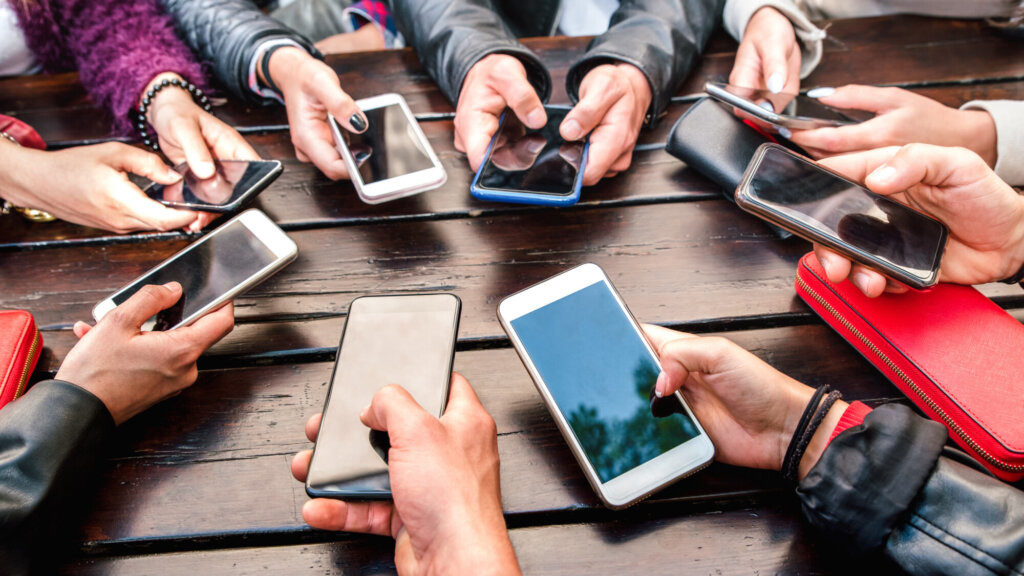Promoting Digital Wellness
How to Guide Young People to Develop Healthy Habits with Technology
In May 2023, the United States Surgeon General issued a warning about the effects of social media use on the mental health of young people. The alarming and urgent call to action asked everyone — from policymakers to technology leaders to parents — to “create safer, healthier online environments to protect children.” Social media is just one example of how the ever-present and ever-growing digital landscape impacts our well-being.
Kids today are exposed to the digital world from a very young age. Smartphones, tablets, and computers are omnipresent in society and nearly impossible to avoid. That is why young people must learn how to develop a healthy relationship with technology. Digital wellness benefits both physical and emotional health, especially for children and adolescents whose vulnerable brains are in critical stages of development.
Culture Reframed has partnered with Digital4Good + #ICANHELP to advance their shared efforts of empowering young people against the dangers of digital media.
“We are very supportive of Digital4Good’s work to foster youth digital empowerment and to prevent cyberbullying or other types of online abuse through education and the promotion of student leadership,” said Dr. Gail Dines, President & Founder of Culture Reframed. “They have impacted millions of young people with the knowledge, skills, and confidence they need to navigate the digital world responsibly, respectfully, and safely.”
What Is Digital Literacy and Why Is It Important for Young People?
Digital literacy is the knowledge and skills to thrive in an increasingly digital world. This includes understanding how to use digital tools in a safe and effective way. Educating youth about digital safety is imperative. The online world is vast and dangerous if you don’t know how to navigate it. Research shows that students who learn digital safety skills are more engaged academically. “Digital safety education allows young people to think critically about their media use and develop skills for media literacy to support healthy, safe, and ethical media use,” said Dr. Mandy Sanchez, Program Coordinator at Culture Reframed.
Teaching digital safety helps students to:
- Understand the adverse effects that excessive screen time and social media use can have on mental health.
- Develop a sense of responsibility that will translate to other areas of their lives;
- Build a positive online footprint that they can benefit from in the future;
Digital4Good offers a collection of Digital Safety courses to help young people set healthy tech boundaries, encourage positive digital interactions, and handle online crises effectively.
Similarly, Culture Reframed’s Program for Parents of Teens includes a section dedicated to “All Things Tech” to help parents understand the potential harm to young people from spending time online. The program provides research-driven, educational videos, conversation scripts to help navigate challenging conversations with teenagers, and other helpful resources.
Digital Literacy and Online Pornography
“There is a critical need for digital safety and wellness for young people, especially to protect them from the harms of hypersexualized media and pornography,” said Dr. Dines.
Mainstream, violent, explicit porn is widely available to young people and easily accessed from any device with an internet connection. Much of this content is misleading, degrading, and objectifying, resulting in a dangerous trifecta that shapes young people’s perception of consent, sexual violence, gender equality, sexuality, and intimate relationships at an extremely young age and without any context.
Pornography is the de facto sex education for young people worldwide.
Culture Reframed’s Sex Education Curriculum includes sections specifically dedicated to digital media literacy. These sessions encourage young people to think critically about their media use and to develop skills for digital media literacy. “The curriculum teaches young people how to contrast the misinformation that is propagated by the porn industry with healthy relationships and accurate information about the body,” said Dr. Sanchez.
Empowering Young People to Develop Healthy Technology Habits
According to Digital4Good, about 37% of 12- to 17-year-olds say they have been bullied online, and only one out of 10 teen victims will inform a parent or adult of their online abuse.
Young people need trusted adults who they can turn to and learn from.
“Culture Reframed’s and Digital4Good’s missions align as we both stand strong in our commitment to expand digital citizenship education (training to educators and students worldwide), promote digital literacy, and ensure a safe and positive online environment for youth,” said Dr. Dines. Educators, parents, and caregivers have the power to help young people build healthy relationships with technology, teach them to safely navigate the online world, and help them improve their digital habits for better mental health and overall well-being.
Explore the resources below from Digital4Good and Culture Reframed to learn how to empower young people towards digital wellness.
Tools, training, and resources from Digital4Good:
- Explore digital safety courses
- Schedule a workshop or presentation
- Become a mentor
- Register for the upcoming free workshop, in partnership with Snapchat, on keeping your teens safe online
Free courses, resources, and more from Culture Reframed:
- Explore the Sex Education Curriculum
- Access the Parents Programs for Parents of Tweens and Teens
- Browse the Academic Library, fact sheets, scientific reports, and curated lists of books, podcasts, videos, and websites that offer in-depth insight into porn’s impact on youth and the actions you can take

